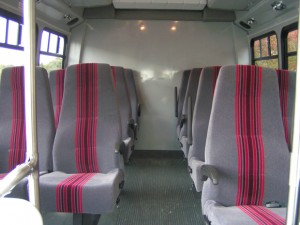Getting the right people in the right seats on the bus
August 2, 2011 Leave a Comment
One of the biggest challenges in an early stage startup is to have enough talent on the team to do all the tasks required to get stuff done right. If you only have a handful of people in your company (i.e. four or less) it is almost impossible to have all the skills needed to deliver a new offering, especially if it is some type of consumer application like ours. So how do you find all the people to do all the work that is needed?

For many years now I have talked to people I work with about people I would label ‘Swiss Army Knives’ and others who I would call functional experts. Swiss Army Knives are basically like the metaphor suggests, they are talented individuals who can perform multiple types of tasks well enough to accomplish the required objectives. This does not mean that they are experts in any specific functional area, but in a startup environment they are able to figure out what is needed and to make it happen. Almost always Swiss Army Knives are choosing this breadth vs. depth capabilities. My experience is that they are very smart and flexible individuals and if they chose to go deep in any specific functional area (and usually they have at least one or two in which they have gone deep) they would be world class in that area. I started my career at Procter & Gamble and they really encourage attracting and developing Swiss Army Knives, and a lot has to do with their philosophy of promotion from within, general management skills and an upward spiral career path. Which basically means that at P&G high performing employees are encouraged to take multiple cross-functional roles during their career as they move up the ladder. Being able to perform well in multiple functions and appreciate different functional roles is a critical leadership and career skill.
A few additional thoughts on Swiss Army Knives, while I don’t have statistical data on this I have found that only a small percentage of people fit this categorization, even in great organizations. What’s even more interesting is that I have found that SAKs tend to find each other and hang out together. I really don’t know why, but it just seems that they tend to have similar values, experiences and outlooks. Also, not being a SAK is not a bad thing either, having deep functional expertise is necessary in almost every company especially when combined with the depth of experience that the SAK will almost never have.
So how does this relate back to driving a successful startup? Well, if you are small and can only have a few folks working full time in your company I would suggest having as many of your early employees being Swiss Army Knives as possible. By having as many people on your team who are able to get things done (in a ‘good enough fashion) within your team means that you do not have to tap outsiders (contractors, consultants, agencies etc.) to help you get them done. Kind of obvious, but it all start with who do you have riding on your startup bus.
My partner John is a Swiss Army Knife. Not only can he tackle just about every technical aspect of our product (such as architecture, web service integration, functional coding, presentation layer functionality, HTML/CSS, dB management, operations etc.) he also has a unique appreciation of consumers and marketing from his past experiences. Thus when we discuss new features or user feedback we can immediately have a great, productive discussion about what to build and translate the conversation into new requirements.
However as you grow your startup you can’t do everything yourself and you can’t hire full-time people for every role that need to be done. There are lots of ways to address this issue via contractors, interns, consultants etc. What we have found to work pretty well for us is using oDesk (www.odesk.com). We use oDesk for both product development and marketing-related experts. oDesk is a great resource if you use it properly but it is certainly not a silver bullet. In fact, our experience is that unless you put a very big effort upfront into hiring and managing the functional experts you find you will be very disappointed in the results. Leading a team on oDesk takes as much effort if not more effort to coordinate (to account for time zone, language and not being in the same room). In fact until we developed the right process and tools for the team, it was hard for some oDesk people to succeed was a challenge for them. But as we have found if you get your ducks in a row and find the one or two key people that ‘get it’ and can ‘do it’ the bang that you get for your buck compared to hiring locally really pays off.
To-date, getting the right people in the right seats on the bus has been a long, iterative challenge with our efforts finally paying off. We are happy where we are today, but of course it is a never-ending battle as we try to grow and keep up with all the new changes to our product and small company.
Good luck to you on getting the right people on the right seats on the bus – and may as many of them be Swiss Army Knives as possible.